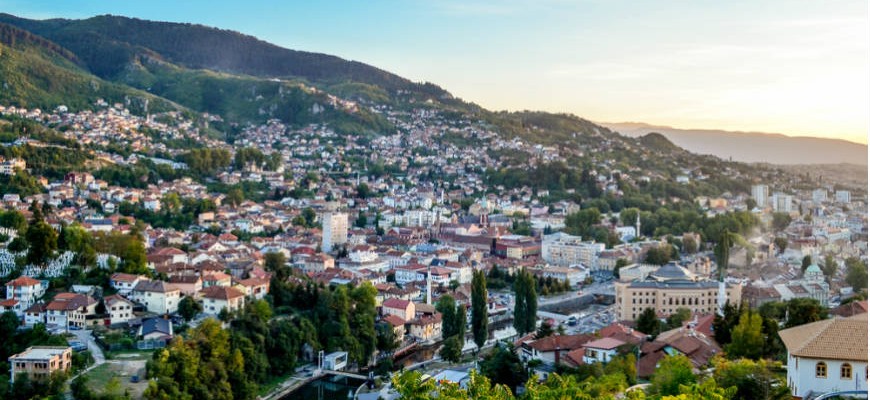Bosnia and Herzegovina

Bosnia and Herzegovina has benefited from co-operation initiatives of the Council of Europe since 2003. The Council of Europe Office in Sarajevo ensures the necessary co-ordination between headquarters and national stakeholders, as well as with international partners present in the field.
The ongoing Action Plan (2022-2025), adopted in December 2021, further strengthened the strategic co-operation between the Council of Europe and Bosnia and Herzegovina, building on the two preceding Action Plans (2015-2017 and 2018-2021). The Action Plan is tailored to the most recent findings of the Council of Europe monitoring bodies while reflecting the country’s European integration agenda as well as reform priorities enshrined in national strategic documents.
Support is provided for a coherent application of the European Convention on Human Rights (ECHR) standards at national level and the effective execution of judgments of the European Court of Human Rights. It also aims at strengthening action against trafficking, managing the rehabilitation of violent extremist prisoners, combatting digital and sexual violence against women, enhancing the quality of local democracy through innovative participatory processes, and combating discrimination, hatred and racism. Furthermore, Bosnia and Herzegovina benefits from the support of the Swedish International Development Co-operation Agency through a project enhancing institutional capacities on freedom of expression and information. Under the ongoing Action Plan, the co-operation with Bosnia and Herzegovina was further reinforced to combat economic crime, money laundering and terrorist financing. The Council of Europe and the authorities of Bosnia and Herzegovina jointly identified other areas of co-operation, providing for effective reintegration of violence extremist offenders, supporting transparency and integrity of electoral processes and enhancing human rights protection through Constitutional justice.
The co-operation with Bosnia and Herzegovina is further supported through the European Union/Council of Europe Joint Programme “Horizontal Facility for the Western Balkans and Türkiye”, which assists the authorities with meeting their reform agendas while complying with European standards. The third phase of the programme, within which six actions are implemented in Bosnia and Herzegovina, is currently under way. These actions contribute to strengthening the efficiency of justice, enhancing the protection of the human rights of persons deprived of liberty (including by working with the National Preventive Mechanism), addressing money laundering and terrorist financing, promoting quality education, inclusiveness and tolerance, and protecting freedom of expression and freedom of the media.
Bosnia and Herzegovina furthermore plays an active role in the regional actions of the Horizontal Facility focusing on the following areas: enhancing regional co-operation in managing violent extremism in prisons, evaluating judicial reform efforts under the Council of Europe flagship initiative based on the CEPEJ methodology “Dashboard – Western Balkans II”, tackling economic crime, promoting equality and combating racism, protecting freedom of expression and freedom of the media, and improving women’s access to justice.
Bosnia and Herzegovina also benefits from two European Union/Council of Europe regional Joint Programmes implemented in South-East Europe. The regional Joint Programme CyberSEE strengthens the rule of law, security and regional co-operation in South-East-Europe and Türkiye through a more effective response to the challenges of cybercrime and electronic evidence. Support in the implementation of Roma inclusion policies enhancing access to basic socio-economic rights is streamlined through the third phase of the Joint Programme on “Roma integration”.
Lastly, Bosnia and Herzegovina benefits from regional projects funded by voluntary contributions. The Human Rights Trust Fund financially supports the implementation of three regional projects. The project “HELP in the Western Balkans” enhances the capacities and skills of legal professionals for the effective application of European standards in human rights. The project “Human Rights and Sustainable Environment in South-East Europe” increases the understanding of the relationship between the protection of human rights under the European Convention on Human Rights (ECHR) and the environment among the judiciary and legal professionals to strengthen environmental protection at the domestic level. Thanks to Germany’s financial contribution, the Council of Europe promotes deliberative democracy in the region as an innovative form of citizen participation in local decision-making.
Through the actions implemented in 2024, the Council of Europe Action Plan for Bosnia and Herzegovina 2022-2025 contributed to the UN 2030 Agenda for Sustainable Development by supporting the United Nations Sustainable Development Goals (SDGs), notably SDG 4 (targets 1 and 7), SDG 5 (targets 1, 2, b and c), SDG 8 (target 7), SDG 10 (target 3), SDG 11 and SDG 16 (targets 1, 2, 3, 4, 5, 6, 7, 10, a and b).
More information: Overview of the Council of Europe Contribution to the UN 2030 Agenda.










